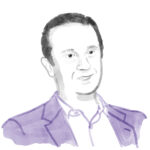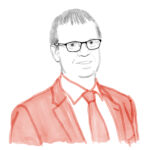Reinsurers must find new ways to maintain and increase their relevance, as new risks emerge and global macroeconomic conditions become more complex. We talk with two large reinsurers about the trends shaping their industry and the challenges ahead.
Luxembourg History
Swiss Re has had a presence in Luxembourg since the 1980s. In 2007 it brought together it’s European Economic Area (EEA) operations together in Luxembourg. Europe accounts for one third of Swiss Re’s group activities.
“Swiss Re’s reinsurance business has its European headquarters in Luxembourg. Our Luxembourg office is essentially a large management and administration hub with specialists in the areas of finance, legal, compliance, actuarial and risk, with a focus on regulatory and governance matters,” says Ivo Hux, General Manager of Swiss Re in Luxembourg, from where it co-ordinates the other branches across the EEA.
Swiss Re set a trend with its EEA strategic home in Luxembourg. Non-EU reinsurers have also located their central EU hub in Luxembourg. TransRe (headquartered in New York) is one such.

We moved to Luxembourg to make our corporate structure more efficient, to enhance our long-term ability to provide underwriting support, reinsurance capacity, financial security and prompt accounting and claims settlement to our customers and brokers.
“We moved to Luxembourg to make our corporate structure more efficient, to enhance our long-term ability to provide underwriting support, reinsurance capacity, financial security and prompt accounting and claims settlement to our customers and brokers,” highlights Jonathan Hewitt, CEO of TransRe Europe. “From Luxembourg we serve our customers and brokers in Continental Europe, Middle East and North Africa. We sought a location within the EU that allowed us to redomicile one of our subsidiaries, had a stable, mature political environment and a reservoir of technical industry expertise. Luxembourg fits all those criteria.”

Ivo Hux, CEO of SwissRe Luxembourg
An Important Industry In A Riskier World

Reinsurance is a growth industry
“Reinsurance is a growth industry,” highlights Hux. The increased sale of insurance products, emergence of new risks and an ever more complex global macroeconomic environment are driving the reinsurance market. Hewitt agrees: “We see increased demand for reinsurance because the world is riskier now than it used to be. In the past few years, 1.2m of rain fell on Houston over two days, Japanese typhoons have been more destructive than expected, state-backed cyber attacks have taken place, and now we have the covid-19 pandemic. We are seeing a change of attitude by our clients, which are in turn being driven by their own customers buying more protection.”
Preparing For The Unexpected
While Covid-19 has had an important impact on the reinsurance sector, the pandemic has always been on the industry’s radar. As Hewitt (who lived and worked in Hong Kong during the first pandemic (SARS) of the 21st century) notes: “Pandemics are not an emerging risk, it is a risk that has always existed and that has long been on our risk register,” says Hewitt.
The digital transformation had changed the nature of risk for the global economy. “Consumers and companies will need cyber insurance in just the same ways as we need fire insurance or motor insurance. Pandemic and global cyber event are systemic, without the geographic boundaries of an earthquake, or windstorm.”
Digital transformation has changed the nature of risk for the global economy. For instance “motor insurance is on the brink of dramatic change, driven by the trends of connected and autonomous cars,” says Hewitt. By 2030, 41% of the traditional motor premium pool are expected to shift to new mobility risk structures. “This is a positive development for society, since road safety will improve dramatically. However it is a real challenge for our industry as motor insurance is the largest segment in many markets, and premium flows will decrease as vehicles become truly autonomous.”
Using Technology To Improve The Business Model
“Let’s not forget that it is not the risks that create growth but rather the solutions reinsurers can provide to those risks,” highlights Hux. “Tech-enabled solutions have a long tradition at Swiss Re, particularly in the underwriting areas, where our data allows us to calculate the appropriate risk premium for areas like life insurance or engineering and construction risks. A partnership with a client can go from pure support for individual risk calculation up to fully automated underwriting and risk sharing“
Reinsurers will continue to reinvent their value to insurers, including speeding up the delivery to market of new products. Swiss Re has an insurance platform that allows clients to get new products to market more quickly, through a cloud-based data-driven application. “We look after the end-to-end journey in a white label structure that allows our client to focus on their core business: selling insurance.”
At the same time, new insurtech players may disrupt traditional relationships. TransRe has developed its own technology capabilities, at the same time working closely with the InsurTech community.
“Artificial intelligence and machine learning will play an increasing role in the underwriting and pricing of risk going forward. We focus our InsurTech efforts and reinsurance capacity on start-ups who can assist us to improve our own operational efficiencies and analytic strengths,” highlights Hewitt.

Let's not forget that it is not the risks that create growth but rather the solutions reinsurers can provide to those risks.

Artificial intelligence and machine learning will play an increasing role in the underwriting and pricing of risk going forward. We focus our InsurTech efforts and reinsurance capacity on start-ups who can assist us to improve our own operational efficiencies and analytic strengths

The Strategic Role Of Alternative Capital
New capital has entered the industry through structures such as insurance-linked securities (ILS).
“Alternative investments including infrastructure loans provide an attractive risk-return profile, particularly when considering the diversification benefits with the rest of the portfolio. It allows us to grow our natural catastrophe book and proactively manage our risk appetite by making use of a broad range of third-party capital, including ILS and retrocession instruments,” stresses Hux who established a dedicated team in charge of managing Swiss Re’s third-party capital activities. “Our Luxembourg entity serves as distributor of our globally originated and structured ILS products to European investors, and will structure deals for European clients.” Swiss Re benefits from the strength of Luxembourg’s fund management industry, through its Luxembourg UCITS fund, with over USD 17bn of net assets.
With low interest rates forecast to continue, the search for yield is likely to persist. “Third party capital increasingly plays a role in reinsurance, and we can assume it will remain a permanent part of the landscape. It supports our own reinsurance selling, and we have an opportunity to provide reinsurance risk pricing and analysis services to other capital providers. We currently do both,” adds Hewitt
“Alternative investments including infrastructure loans provide an attractive risk-return profile, particularly when considering the diversification benefits with the rest of the portfolio. It allows us to grow our natural catastrophe book and proactively manage our risk appetite by making use of a broad range of third-party capital, including ISL and retrocession instruments,” stresses Hux who established a dedicated team in charge of managing Swiss Re’s third-party capital activities. “Our Luxembourg entity serves as distributor of our globally originated and structured ILS products to European investors, and will structure deals for European clients.” Swiss Re benefits from the strength of Luxembourg’s fund management industry, through its Luxembourg UCITS fund, with over USD 17bn of net assets.
With low interest rates forecast to continue, the search for yield is likely to continue. “Third party capital increasingly plays a role in reinsurance, and we can assume it will remain a permanent part of the landscape. It supports our own reinsurance selling, and we have an opportunity to provide reinsurance risk pricing and analysis services to other capital providers. We currently do both,” adds Hewitt.
The Growing Demand for ESG
“Clearly the most significant long-term threat is climate change,” says Hux. “Addressing sustainability topics is economically relevant for the liability as well as the asset side of our business. We have released studies showing that over the last 3 years, implementing ESG considerations in the investment process could provide better risk-adjusted returns.”
Swiss Re has committed to decarbonise and achieve net-zero CO2 emissions by 2030 for its own operations, and by 2050 from all its insurance offerings and investments.
“Rating agencies are putting ESG into their criteria for assessing the viability of companies and the sustainability of clients’ business models. It is our responsibility as risk carriers, to address these issues,” adds Hewitt. “Our clients are insurers, but their customers are looking closely at their service provider business practices, and those insurers will expect the same of us.”
Reinsurers Support Resilient Economies
As covid-19 economic loss estimates exceed USD 12 trillion, both reinsurers highlight how solutions must be handled by more than just insurers and reinsurer.
As covid-19 economic loss estimates exceed USD 12 trillion, both reinsurers highlight how solutions must be handled by more than just insurers and reinsurer.
“It is our responsibility as risk carriers to help economies find solutions to emerging risks. We have to manage emerging risks on our balance sheet, but it’s also an opportunity for us to generate business in support of growing economies,” stresses Hewitt.
“Our industry cannot cover all risks. The question is how we will work with governments, and other stakeholders to create solutions to make societies more resilient. Our goal is a win-win for society: we support governments in making their communities financially robust, while closing a massive protection gap and thus growing our business,” concludes Hux.
Focus - Insurance: rising up to challenges: other articles
-

Other article
Insurance in the aftermath of Brexit
-

Other article
Stability and adaptability – a cornerstone of success
-

Other article
A change of scenery – from one hub to another
-

Other article
Building financial inclusion through technology
-

Other article
Facing the tidal waves of a changing environment






